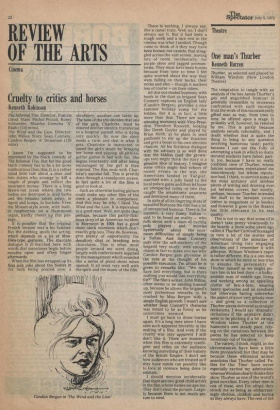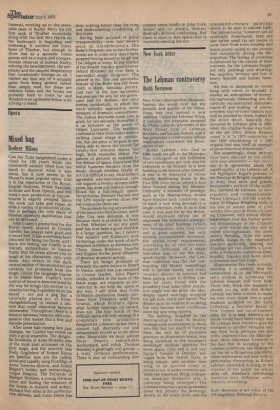Theatre
One man's Thurber
Kenneth Hurren
Thurber, as selected and played by William Windom (New London Theatre) The temptation to tangle with an analysis of the late James Thurber's gay and anguished humour iS generally irresistible to reviewers confronted with such excerpts from the work of this inconsistently gifted man as may, from time to time, be offered upon a stage. It probably will, however, be resisted by me. This is partly because analysis entails rationality, and I doubt whether that is quite the thing to bring to any question involving humorous taste; partly because I can see the folly of attempting a task in which so many devoted students have failed; partly, too, because I have no really confident view of Thurber, whose fancies sometimes entertained me immoderately, but whose reputation had, I think, to survive some of the most unfunny and aimless pieces of writing and drawing ever put between covers; but mostly, perhaps, because Thurber intended the stuff to be between covers (either in magazines or in books) and however it goes in the theatre has little relevance to its real quality.
This is not to say that some of it doesn't take pretty vivaciously to the boards: a show some years ago called A Thurber Carnival managed to turn a lot of the stories and observations of the minutiae of American living into engaging sketches and I remember it with affection. William Windom's caper is rather different. His is a one-man show in which he more or less tries to assume the personality of Thurber himself as we might picture him in his best days — a bulky, amiable man of middle age, living and working among an appalling clutter of bric-A-brac, wearing heavy spectacles and an eyeshield but otherwise having somewhat the aspect of a not very grizzly near — and gives us a collection of Thurber pieces delivered as straight recitations. I would say 'dramatic' recitations if the adjective didn't seem to be pitching it a bit strong. Windom takes Thurber at the humorist's own steady pace, relying on the variations between the pieces he has selected to keep monotony out of his show.
The variety, I think, might, in the circumstances, have been a little more pronounced, but that may be because those whimsical animal anecdotes that Thurber called 'Fables for Our Time' have never especially excited my admiration, whereasWindomclearlythinksthey show Thurber as one of the world's great moralists. Every other item is one of these, and I'm afraid they struck me as being as embarrassingly obvious, childish and boring as they always have. The rest of the material, working up to the inevitable peak of Walter Mitty (in the first rank of Thaiber immortals, along with the first Mrs Harris on the bookcase), is beguiling and endearing. It exhibits not every facet of Thurber, but enough to show him as a sporadic comic genuis and as a warm and compassionate observer of human frailty, echoing the bewilderment, the perplexity and the unquiet desperation that occasionally besiege..us all. I cannot say that any of it actually gains from being spoken rather than simply read, but these are indolent times and the books are probably hard to come by and Windom is an agreeable fellow with a living to make.



































 Previous page
Previous page